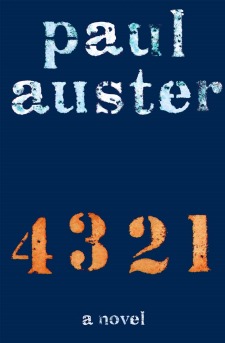As much as I liked 4 3 2 1, I felt a real need to read something really different when I finished it. So I went for the delights of a foodie in Spain and a book of short stories. That's how Grape, Olive, Pig: Deep Travels Through Spain's Food Culture by Matt Goulding and We Live in Water by Jess Walter jumped to the top of my reading stack for next week.
Finished!

4 3 2 1 by Paul Auster
Superb! All 880 pages. Some of it was painful to read as it covers the unrest of the student and civil rights activities of the 1960's and Auster doesn't pull any punches. The structure of the book--taking one character and giving him four alternate lives to lead worked very well.
Advanced Reader Copy
More Pushkin: (for a full list of the contents of the volumes I've been working with see my post Pushkin - Contents notes)
From: The works of Alexander Pushkin : lyrics, narrative poems, folk tales, plays, prose; selected and edited, with an introduction, by Avrahm Yarmolinsky. (Random house, 1936)
Kirejali (p 590-598) translated by T. Keane
Folk Tales (p 315-329) The Tale of the Pope and of His Workman Balda, translated by Oliver Elton; The Tale of the Golden Cockerel, translated by Babette Deutsch
The Captain's Daughter (p 599-741) translated by Natalie Duddington
Unfinished Stories p 745-891): The Negro of Peter the Great; Dubrovsky; Egyptian Nights, all three translated by T. Keane
Boris Godunov (p 333-411) translated by Alfred Hayes
Introduction As I often do when reading classics, I read the introduction last.
The Little Tragedies; by Alexander Pushkin; translated and with introduction and critical essays by Nancy K. Anderson. (Yale University Press, 2008)
I originally pick this up because I wanted to read A Feast During the Plague which is not included in the Random House edition (above). However, after finishing the entire Random House book, I decided to read more in this volume to see how a different translator worked with the material. The opening essay The Little Tragedies in English: an Approach addresses this question and was an informative discussion. As to the plays themselves, at times I preferred this 2008 translation over Keane's 1936 translation, although in a few places I felt hers was a bit too modern. I'm glad I read both.
Her critical essays really added to my appreciation of the plays. I'm glad I went to the trouble of tracking down a copy of her book.

Auditing another online course Visualizing Japan (1850s-1930s): Westernization, Protest, Modernity
This one is self-paced and I tried to avoid going too fast, but it was so interesting that I finished it in a week. It is part of a series so I moved on to Visualizing Postwar Tokyo, Part 1. I'm not moving as fast on this one, but I'm finding the material fascinating.
 |
| “Deal Me In 2017!” |
This week's story: Fish Spine by Santiago Nazarian
(in The Future Is Not Ours: New Latin American Fiction)
In this story a young man who helps his parents in the market. tries to wash the smell of fish from his hands before spending an evening with his friends.

Online
This week's card for “Deal Me In 2017!” is the Ace of Spades. I thought in honor of the story's setting I would try to find a Brazilian card. I found a brief illustrated essay on Playing Cards in Brazil one of their examples is this scenic Ace of Spades made by Azevedo, Recife, Brazil, c.1925.
This is part of a large web site, The World of Playing Cards, which has information on all kinds of cards and card collecting. They also sell cards.
13 of the Most Fascinating Public Sculptures This is from Architectural Digest and I'm not posting a picture--but they really are fascinating!
Thanks for sharing that link to the playing card website. I've become a collector (a side-effect of hosting the Deal Me In challenge) and am continually amazed at just how many 'novelty' card decks are out there. :-)
ReplyDeleteI think designing playing cards must an irresistible challenge for some artists. Of course, collecting them is too. I love searching the net for one that somehow goes with the story I'm reading for that card.
ReplyDelete